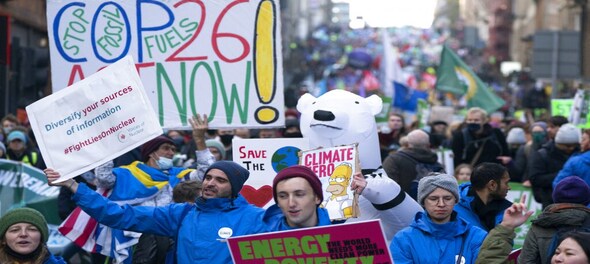
Delegates from nearly 200 countries made many positive commitments at the COP26 UN Climate Change Conference in Glasgow last year. One of these commitments included the Nationally Determined Contributions or NDCs, which focused on cutting emissions and adapting to climate impacts.
As COP27 is set to commence in Egypt's Sharm El-Sheikh next week, only two dozen countries have been able to improve their NDCs so far.
At the same time, factors such as Russia’s war with Ukraine and spiralling prices of fuel and other essentials have shifted the focus of governments away from climate change.
Relaxation of COVID-19 norms on travel and other economic activities during the year resulted in a rise in carbon dioxide emission by 6 percent in 2021 to 36.3 billion tonnes, their highest-ever level, an analysis by the International Energy Agency (IEA) showed.
COP26 recap
The COP26 was conducted amid growing global concern about the effects of climate change, with the world witnessing increasing occurrences of extreme heat, storms, rise in sea level, ocean warming and acidification, melting glaciers, habitat destruction, and biodiversity loss.
More than 120 world leaders and 40,000 registered participants agreed to secure global net zero by 2050 and keep 1.5 degrees Celsius degrees within reach by phasing out unabated coal power, reducing deforestation, increasing use of electric vehicles and stimulating investment in the renewable energy market.
The participants pledged to adapt to protect communities and habitats. They also committed to raising at least $100 billion in climate finance per year.
A year later, it is likely that the world will overshoot the Earth’s average temperature to 1.5 degrees Celsius above its pre-industrial level. Here’s a look at the pledges made at the UN COP26 climate talks in Glasgow in 2021 and the progress made by countries, banks and business leaders so far.
NDCs
Only a few countries, including Indonesia, South Korea and Australia, have upgraded their NDCs so far. The 27-country European Union, which is the world’s third-biggest polluter, is expected to upgrade its target in 2023, Reuters reported.
China is unlikely to improve its pledge to peak emissions before 2030. In March, Brazil had submitted a plan that actually would result in higher emissions than under its 2016 pledge. However, some change may come with Luiz Inacio Lula da Silva winning the presidential race by defeating Jair Bolsonaro.
Deforestation
At the COP26, over 100 countries, including Brazil, Indonesia and Congo pledged to end deforestation by 2030. The three countries together account for more than 80 percent of the world’s remaining tropical forests. To achieve the goal, area deforested needs to come down by 10 percent each year from the 2020 cover.
However, last year, deforestation fell by just 6.3 percent, Reuters reported quoting the Forest Declaration Platform which tracks progress on the goal.
At the same time, Amazon deforestation reached its highest level since 2006. Preliminary government data revealed that it is likely to have gone up by further 23 percent in the first nine months of 2022.
Meanwhile, Congo announced plans to open up rainforest areas and carbon-rich peatlands for drilling of oil and gas. Only Indonesia witnessed deforestation slow since 2016.
Glasgow Financial Alliance
The Glasgow Financial Alliance for Net Zero, a coalition of banks, insurers and asset managers, was set up after the COP26 climate conference. With total assets exceeding $130 trillion, the alliance had committed to help finance the global transition to net zero.
While two pension funds have reportedly quit the alliance, three big signatories – Bank of America, JPMorgan and Morgan Stanley – are also threatening to leave, Raconteur reported.
The three Wall Street banks fear being sued over increasingly stringent decarbonisation commitments by being part of the financial alliance to tackle climate change.
According to reports, the banks are among a number of US financial institutions who continue to lend to polluting coal projects even after signing the alliance.
Methane pledge
Even though 119 countries and blocs, including the US and the European Union (EU), pledged to bring down methane emissions by 30 percent from 2020 levels by 2030, only 15 have drawn up concrete plans to do so, the World Resources Institute said in a report.
Fossil fuels
France, Germany, US, Britain and Canada vowed to stop public financing for fossil fuel projects abroad by 2022-end, except in “limited” circumstances complying with climate goals. The upcoming climate conference is expected to see a few more countries make the pledge.
First Published: Nov 3, 2022 4:18 PM IST
Check out our in-depth Market Coverage, Business News & get real-time Stock Market Updates on CNBC-TV18. Also, Watch our channels CNBC-TV18, CNBC Awaaz and CNBC Bajar Live on-the-go!


Delhi, Indore, Surat and Banswara — why these are the most challenging domains for Congress internally
May 4, 2024 1:53 PM
Congress nominee from Puri Lok Sabha seat withdraws, citing no funds from party
May 4, 2024 12:00 PM
Lok Sabha Polls '24 | Rahul Gandhi in Rae Bareli, why not Amethi
May 4, 2024 9:43 AM

